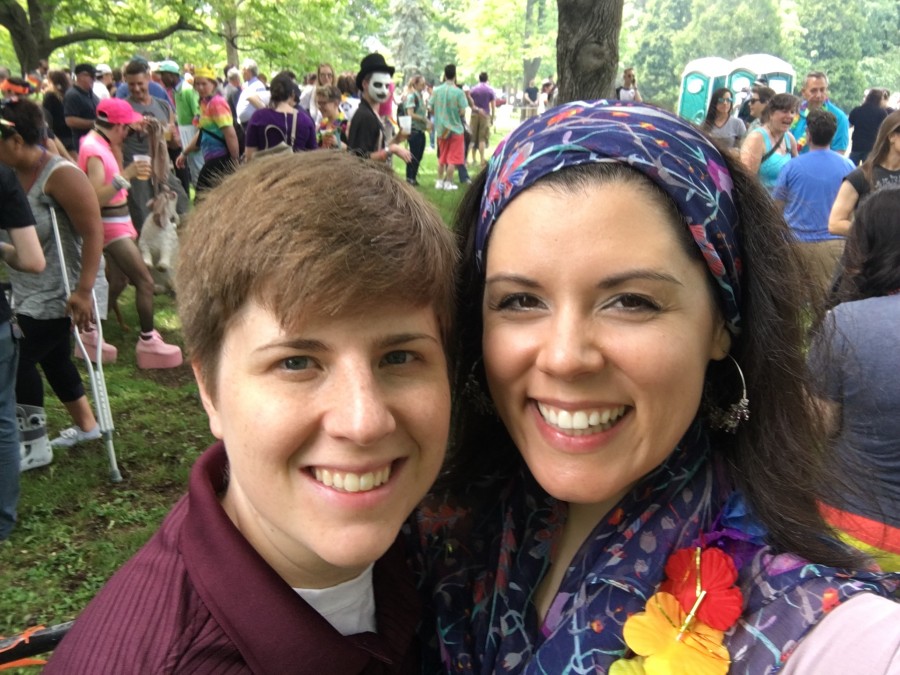by Tara Baysol
In 2013, I was diagnosed with brain cancer at the age of 27. Shortly after my diagnosis, I learned that I have a genetic mutation that predisposes me to a risk for developing multiple primary cancers. Since that time, I have had various tumor findings that have required regular screening and multiple surgeries, including: a craniotomy, bilateral mastectomy, and total hysterectomy. After nearly a decade of living with cancer, my wife and I have learned a lot about what it means to be a same-sex couple navigating the healthcare system with a cancer diagnosis.
We have experienced our share of intolerance from homophobic healthcare workers that created additional layers of vulnerability and fear that compounded an already overwhelming situation. The desire to avoid being victims of discrimination led to many moments of not wanting to continue trying to seek care. Ultimately, though, what got me through those darker times was a combination of finding an incredible support system and trusting in my own self-worth as a proud cisgender femme lesbian cancer-fighter with a lot of love to give and life to experience. Putting my health on the backburner was not going to be an option for me.
I began reaching out to other LGBTQ community members experiencing cancer, and had the privilege to be able to seek out a healthcare organization that marketed LGBTQ inclusiveness. A commitment to inclusion and diversity is an essential part of ensuring quality medical care and access. When people feel alienated or disrespected during health care encounters, they are less likely to seek, advocate, and follow through on care.
That said, even after finding a system committed to serving our community, I still occasionally encounter some insensitive interactions that leave me briefly cringing at the awkward moments. I have had to remind myself that even ally organizations and care team members can still sometimes lack the cultural humility needed to truly connect with us. What has allowed me to face these moments with more resilience has been equipping myself with tools that empower me to address those awkward moments with clarity and purpose.
Over the years, my wife and I have created empowering responses to common faux pas/party fouls that we have experienced by well-intended ally care team members. Whether it’s misgendering my cisgender butch wife, assuming her to be a sister or friend, or praising the fortune of having a partner with a uterus in attempts to comfort the loss of my own female organs; we have transformed these frustratingly insensitive encounters into opportunities to educate others and represent our beautiful community.
After processing how those uncomfortable encounters made us feel, we developed empowering responses for future dialogues. We did this by considering what would help us stand in our power; and whenever a situation seemed to not have any reassuring options, we asked others from the rainbow community for ideas on how they might go about similar scenarios. We continue to rely on the amazing local and virtual resources that connect us to fellow LGBTQ people and provide us with safe spaces to reflect, heal, and grow.
If I were to offer advice to a fellow rainbow cancer-fighter, it would be to prioritize self-care. Whether you’re fearing the real vulnerability that comes from discrimination or just dreading the awkward coming out process when establishing care with an ally-identified provider, medical appointments can provoke a lot of emotions that can act as deterrents to seeking care. That said, there are many community members and allies in the health care system who are wanting to help provide you with quality care. Find those amazing heroes and advocate for the healthcare you need. And make sure to do something out in the LGBTQ community along the way, whether it’s finding a Meetup event to go to or watching an empowering movie or show.
It is important to be able to make time after stressful appointments for something relaxing and enjoyable that reminds you to love and care for yourself. You deserve it.
